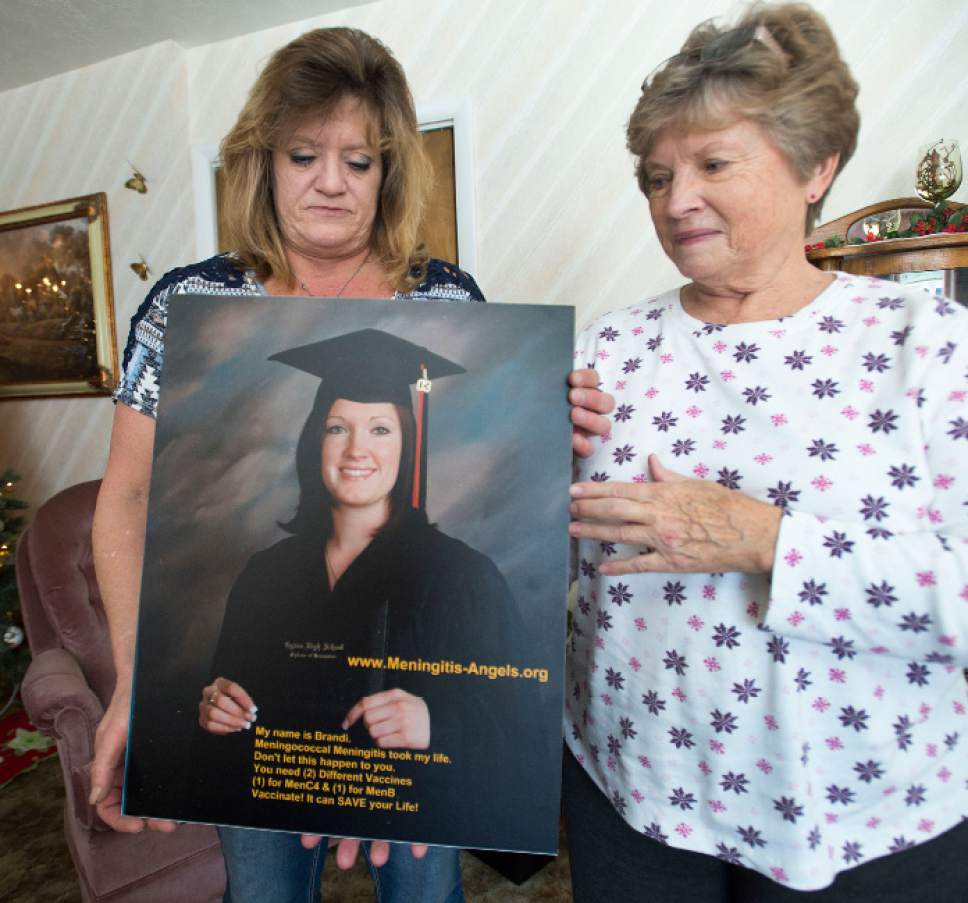This is an archived article that was published on sltrib.com in 2016, and information in the article may be outdated. It is provided only for personal research purposes and may not be reprinted.
Eden • The first responders and anxious family members crammed into the house were a blur to Gina Thompson, her vision singularly focused on the basement door.
Not long before, Gina's only daughter, Brandi, had been found dead in a basement bedroom. And all Gina wanted to do was hold her 21-year-old baby girl.
But as she fought through the crowd, first responders were there to block her path: They didn't know how Brandi had died, they said, so no one could disturb the scene.
Police questioned Brandi's drug use. They questioned her alcohol intake. They wanted to know every detail leading up to her death on Feb. 21, 2007.
But what really killed Brandi left her family flabbergasted, forcing them to Google a disease they had never heard of.
The unknown assailant was bacterial meningitis, an infection of the fluid around the brain and spinal cord. There's a vaccine to protect against this deadly disease, but Utah is one of only 12 states that does not require college-age students to get it, according to the Immunization Action Coalition.
If they had, Brandi likely would still be alive today.
"We're trying to get the word out to everyone" about the vaccine: "Come on people, what is wrong with you?" said Janet, Brandi's grandmother. "Maybe it isn't such a large-spread disease and you think, 'It won't happen to me.' But it could."
—
Rare but deadly • Brandi was going to cosmetology school and working multiple jobs when she started to feel ill in February 2007.
It seemed like the flu, Gina said, so Brandi brushed it off. But then the blinding headache and nausea became too much to bear, and Gina said she went to a doctor who prescribed migraine medication.
Meningitis symptoms can look like those of the flu — headache, nausea and increased sensitivity to light — and usually occur within seven days of exposure, according to the Centers for Disease Control and Prevention.
The disease is spread from person to person during close or lengthy contact. For example, it can be spread through saliva, coughing or kissing, the CDC states.
And the disease can be deadly, like in Brandi's case, if it is not caught early enough.
Between 2003 and 2007, 500 of the 4,100 cases of bacterial meningitis in the U.S. resulted in death, the CDC reports.
In Utah, seven of the 19 people who have contracted bacterial meningitis since 2012 died, according to the state Department of Health.
If caught early enough, the disease is treatable. However, people who recover often suffer permanent disabilities such as hearing loss, as well as brain damage, the CDC reports.
But fast acting treatment, and the resulting disabilities, wouldn't be necessary if people were vaccinated against it, Gina said.
"I had no idea there was a vaccine," Gina said. "I had no idea what [the disease] was."
—
No mandates • Last year, the state department announced that seventh-grade students would be required to get vaccinated against bacterial meningitis.
That policy change is in line with Advisory Committee on Immunization Practices recommendations — approved by the CDC — that state children age 11 to 12 should receive the vaccine.
But the state doesn't follow the committee's other meningitis recommendation that individuals age 16 to 18 also should be vaccinated.
Rich Lakin, the department's immunization program manager, said it was difficult to put the seventh-grade requirement into place. And taking another such mandate to the Legislature would be another barrier.
"To try to impose more mandates upon either schools or universities would be quite difficult in this state," Lakin said.
But Lakin said university students should get the vaccine because they are more likely to live in close quarters, such as dorms, and share food and beverages.
Without a state mandate, colleges are left to determine their own vaccination policies.
Of the state's 10 largest colleges, only one requires it upon entry, and only for some students: Westminster College requires it for students who will be living in residential housing.
Eight don't require the vaccination, and it's unclear what Snow College's policy is; representatives did not respond to a request for comment.
Lakin said the department doesn't do outreach with college-age students about getting the vaccine, largely because of a lack of funding. However, he said the vaccine is available at local health departments and doctors' offices. It costs between $100 and $150, but is covered by most insurance companies, he said.
After Brandi's death, Janet made sure all her grandchildren were vaccinated against the infection.
It's better to be safe than sorry, she said.
astuckey@sltrib.com Twitter @alexdstuckey



